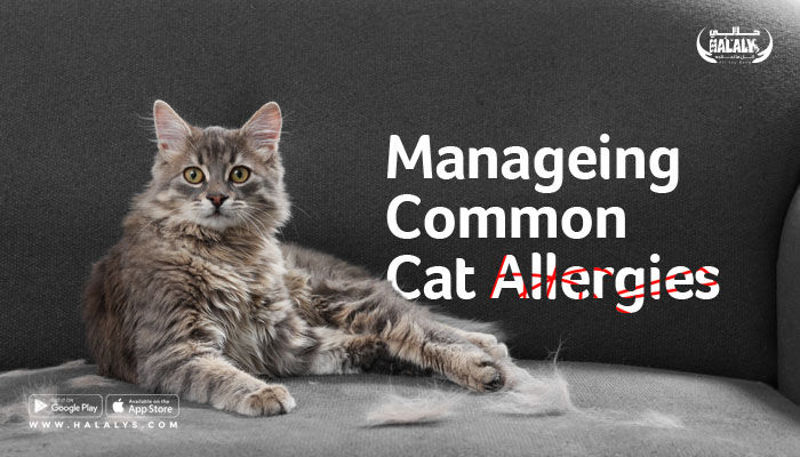Cat allergies are a common concern for many pet owners and animal lovers. While the joy of having a feline companion is undeniable, the sneezes, itchy eyes, and other symptoms that come with allergies can negatively affect this experience.
Identifying cat allergy symptoms, Testing for cat allergy, exploring various cat allergy treatments, and choosing the right cat food for allergies can significantly improve the quality of life for humans and cats that live with them.
This blog will walk you through the essentials of managing common cat allergies, ensuring you can enjoy your time with your beloved pet without discomfort.
Understanding Cat Allergies: What Causes Them?
Cat allergies are primarily caused by proteins found in a cat’s saliva, urine, and dander. These proteins can trigger allergic reactions in sensitive individuals when they come into contact with their skin or are inhaled. Understanding these triggers is the first step in managing allergies effectively.
Identifying Cat Allergy Symptoms
-
Skin Reactions: Often, individuals may notice hives or a rash on the chest, face, or neck.
-
Respiratory Issues: Common symptoms include sneezing, coughing, and wheezing.
-
Eye Irritations: Red, itchy, or watery eyes are also frequent complaints associated with cat allergies.
The Role of Cat Allergy Tests in Diagnosis and Managing Common Cat Allergies
Testing for a Cat allergy is essential to confirm if your symptoms are caused by a cat. skin prick tests and specific IgE blood tests can help determine your sensitivity to cat allergens.
Cat Allergy Treatment Options
-
Medications: Over-the-counter and prescription antihistamines, decongestants, and nasal corticosteroids can help alleviate symptoms.
-
Immunotherapy: Allergy shots or tablets may be recommended for long-term relief.
-
Environmental Controls: Regular cleaning and using air purifiers can reduce allergen levels in your home.
Practical Tips for Living with Cat Allergies
-
Regular Grooming: Bathing your cat regularly can reduce the presence of allergens.
-
Clean Household Surfaces: Vacuum and wipe down surfaces regularly to remove dander and hair.
-
Specify Areas for Your Cat: Keeping certain areas of your home cat-free, particularly bedrooms, can help reduce exposure to allergens.
When to Consult a Professional for Cat Allergy Management
If symptoms persist or worsen, it may be time to consult a doctor. Professional guidance can help tailor treatments and strategies to your specific needs.
Conclusion
Living with cat allergies can be challenging, but with the right strategies, it's possible to enjoy your cat’s companionship.
By understanding the nature of your allergies, utilizing effective treatments and preventive measures, and making appropriate adjustments to your environment and lifestyle, you can minimize discomfort and maximize your enjoyment of your pet.
Remember, the key is to manage the environment and your exposure to allergens, not necessarily to eliminate your beloved pet from your life.
FAQs
What are the first steps to take if I suspect I'm allergic to my cat?
If you start experiencing symptoms like sneezing, itchy eyes, or respiratory difficulties around cats, the first step is to consult a healthcare provider. They can recommend an allergy test to confirm if your symptoms are due to a cat allergy. It’s also helpful to note your symptoms' timing and severity, as this information can aid diagnosis and management.
Can changing my cat’s diet help reduce allergy symptoms?
Yes. According to some studies; changing your cat’s diet helps reduce allergy symptoms. Feeding your cat high-quality, hypoallergenic food can reduce the production of potential allergens found in their saliva and dander. This change should be made under the guidance of a veterinarian to ensure it meets your cat’s nutritional needs.
What are the most effective home remedies for reducing cat allergens?
Effective home remedies for reducing cat allergens include frequent cleaning of your home, particularly areas where your cat spends a lot of time. Wash bedding, curtains, and any washable fabrics regularly. Air purifiers with HEPA filters can also capture airborne allergens, reducing the amount present in your environment.
How often should I clean my house to keep cat allergens at bay?
To effectively manage cat allergens, it is advisable to clean your house at least twice a week. Focus on areas like carpets, furniture, and any fabric surfaces where allergens may accumulate. Additionally, investing in a good quality vacuum cleaner with a HEPA filter can significantly reduce the presence of allergens.
Is there a permanent cure for cat allergies?
Currently, there is no permanent cure for cat allergies, but symptoms can be managed effectively through various treatments and preventive measures. Allergy immunotherapy, which involves exposing the body to small amounts of allergens to build tolerance, has been shown to provide long-term relief for many allergy sufferers.
What should I look for in a cat allergy test?
When considering a cat allergy test, look for options that can specifically identify cat allergens among other common allergens. Both skin prick tests and specific IgE blood tests are reliable. It’s important to perform these tests under the guidance of a qualified allergist who can interpret the results and provide a comprehensive management plan.























































